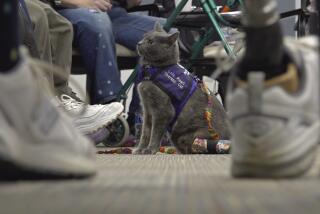COUNTYWIDE : Pets Take Patients Back Home
- Share via
There are some memories that even Alzheimer’s disease cannot steal.
There are times when Gertrude Frazier can’t remember her daughter’s name. But she remembers her childhood on a Tennessee farm with perfect clarity, recalling with fondness the taste of stewed squirrel and how the barnyard chickens scratched for feed in the dirt.
And when a fluffy, month-old chick was passed around her adult-day-care center in Mission Viejo recently, the 86-year-old woman blurted out its name.
“That’s a Rhode Island Red,” she said. “They taste mighty good, too.”
Every month, puppies, bunnies and even an occasional Vietnamese potbellied pig visit the regulars at the Saddleback Valley YMCA adult-day-care center, most of whom suffer from Alzheimer’s.
The well-documented effects of the disease include loss of memory, dementia and, eventually, death. But although short-term memory loss is common, doctors say long-term recall is often unimpaired. And that’s where the animals come in, said Laurie Bergeson, director of the center.
“The animals touch them in a real basic way,” Bergeson said. “It brings back a lot of memories . . . maybe relive the memory of a family dog and happy times.”
Ruth Horn, 76, stroked the coarse, black hair of a baby Vietnamese potbellied pig and remarked that it certainly didn’t remind her of the family dog.
“Acts more like a cat,” she said, scratching behind the pig’s ear and making it grunt with pleasure.
Horn recognizes that there is no cure for Alzheimer’s, which she says causes the top of her head to ache “like a white-hot poker is touching it.”
The only way to ease the pain “is to keep busy,” she said, “and these little animals help me keep busy and forget about the pain for a while.”
Pet therapy is being used by a growing number of hospitals, nursing homes and social agencies throughout the country, health care officials say.
Louis Sarrao, clinical director of the Fairview Developmental Clinic in Costa Mesa, said that pet therapy helps restore some normalcy to patients’ lives.
“We’re strong advocates” of pet therapy, he said. “Our main thrust is normalization, and the animals help create a more normal environment for an institutionalized patient.”
For the last three years, Bob Burrud and his animals have become a familiar sight at nursing homes and clinics around the county. A former pet-shop employee, Burrud concocted the idea of a traveling animal show as a social-service student at Cal State Fullerton.
“It may sound corny, but animals give unqualified love,” he said. “For older people, that’s an important thing because a lot of them have lost some or all of their family.”
Burrud, who runs an animal-companion service, borrows some of the more exotic pets from area pet shops. Past trips to the day-care center have included such animals as opossums, Holland lop-eared rabbits, mockingbirds and even a boa constrictor.
The six-foot boa sometimes intimidates people, Burrud said, but one elderly woman at a rest home who spotted the snake whistled Burrud over.
“She said, ‘Honey, come over here with that,’ and took the boa from me,” Burrud said. “Turns out she worked with snakes as a strip dancer on the Barbary Coast. She had a lot of memories of those days.”
More to Read
Sign up for Essential California
The most important California stories and recommendations in your inbox every morning.
You may occasionally receive promotional content from the Los Angeles Times.













